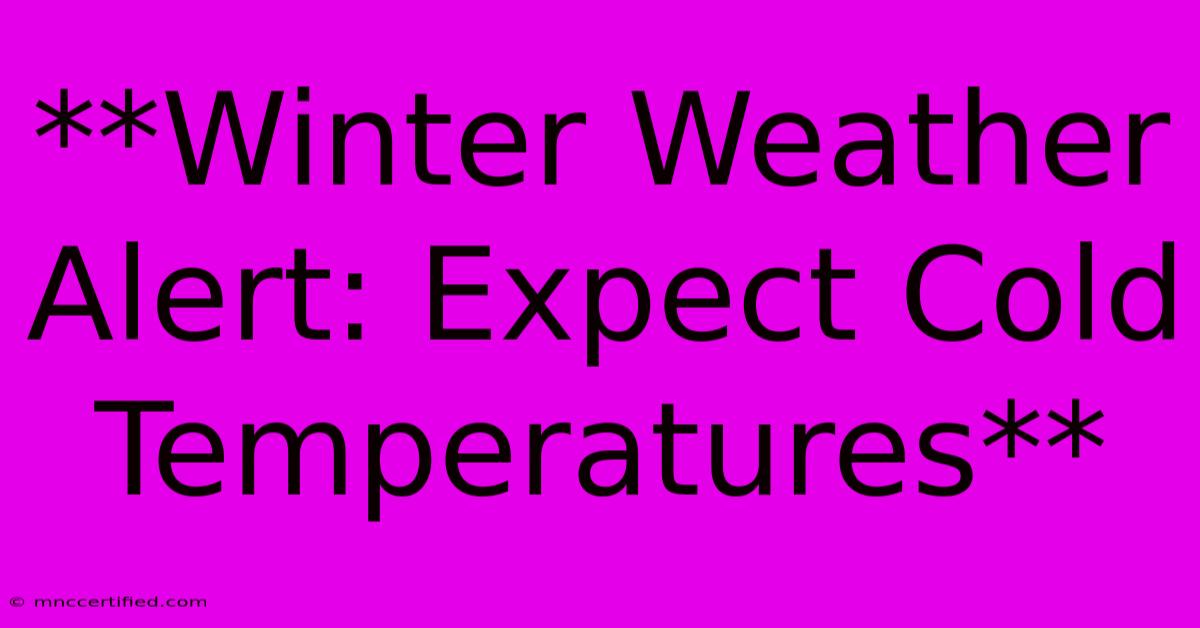**Winter Weather Alert: Expect Cold Temperatures**

Table of Contents
Winter Weather Alert: Expect Cold Temperatures and Prepare Accordingly
Winter is here, and with it comes the possibility of frigid temperatures that can pose a risk to your health and well-being. As temperatures plummet, it's crucial to stay informed and prepared to combat the chill. This guide will provide essential tips for staying safe and comfortable during winter weather alerts.
Understanding the Risks of Cold Weather
Hypothermia: The most serious risk associated with cold weather is hypothermia, a condition where your body temperature drops dangerously low. Hypothermia can occur gradually and often without noticeable symptoms in the early stages.
Frostbite: Another danger is frostbite, which occurs when skin and underlying tissues freeze. Frostbite can cause permanent damage, including loss of limbs in severe cases.
Other Risks: Cold weather can also exacerbate existing medical conditions, such as asthma and heart disease. It can also lead to increased energy costs and disruptions to transportation.
Staying Safe During Cold Weather
Dress Warmly: Wear multiple layers of clothing, starting with a thin base layer, followed by an insulating layer, and an outer layer that's windproof and waterproof. Don't forget a warm hat, gloves, and scarf.
Stay Hydrated: Dehydration can make you more susceptible to the cold. Drink plenty of fluids, even if you don't feel thirsty.
Limit Outdoor Exposure: If possible, limit your time outdoors when temperatures are extremely low.
Check on Vulnerable Individuals: Ensure that elderly neighbors, people with disabilities, and those living alone are safe and have access to heat.
Keep Your Home Warm: Set your thermostat to at least 68 degrees Fahrenheit (20 degrees Celsius) when you're at home. If you have young children, consider setting it even higher.
Be Prepared for Power Outages: Have a backup heating source, such as a fireplace or wood-burning stove. Consider a portable generator if you have medical equipment that requires electricity.
Recognizing Symptoms of Hypothermia and Frostbite
Hypothermia Symptoms:
- Shivering
- Slurred speech
- Confusion
- Loss of coordination
- Drowsiness
Frostbite Symptoms:
- Numbness
- Tingling
- Pain
- Skin that looks pale, gray, or waxy
What to Do: If you suspect hypothermia or frostbite, seek medical attention immediately.
Staying Informed About Winter Weather Alerts
Monitor Weather Forecasts: Pay close attention to local weather forecasts and warnings.
Sign Up for Alerts: Many communities offer weather alerts through text messages, emails, or social media. Sign up for these alerts to stay informed of any changes in weather conditions.
Check on Road Conditions: Before traveling, check the road conditions in your area. Ice and snow can make roads treacherous.
Taking Action to Prepare for Cold Weather
Inspect Your Home: Check your furnace and make sure it's working properly. Insulate your home to prevent heat loss. Seal any cracks or gaps around windows and doors.
Prepare an Emergency Kit: Have a supply of non-perishable food, water, blankets, and other essential items in case you lose power or need to stay home for an extended period.
Check on Your Car: Make sure your car is winterized. Check your battery, antifreeze, tires, and windshield wipers. Keep a winter emergency kit in your car, including blankets, jumper cables, and a flashlight.
Staying Safe and Comfortable This Winter
By following these tips, you can stay safe and comfortable during winter weather alerts. Remember, preparation is key to minimizing the risks associated with cold temperatures.

Thank you for visiting our website wich cover about **Winter Weather Alert: Expect Cold Temperatures**. We hope the information provided has been useful to you. Feel free to contact us if you have any questions or need further assistance. See you next time and dont miss to bookmark.
Featured Posts
-
How To Qualify For Jupiter Airdrop
Nov 15, 2024
-
2 Hands Lyrics Breakdown Tate Mc Rae
Nov 15, 2024
-
Beam Dental Insurance Phone Number
Nov 15, 2024
-
Eagles Gain Lead Hurts Scores 1 Yard Td
Nov 15, 2024
-
France Vs Israel Uefa Nations League Livestream
Nov 15, 2024